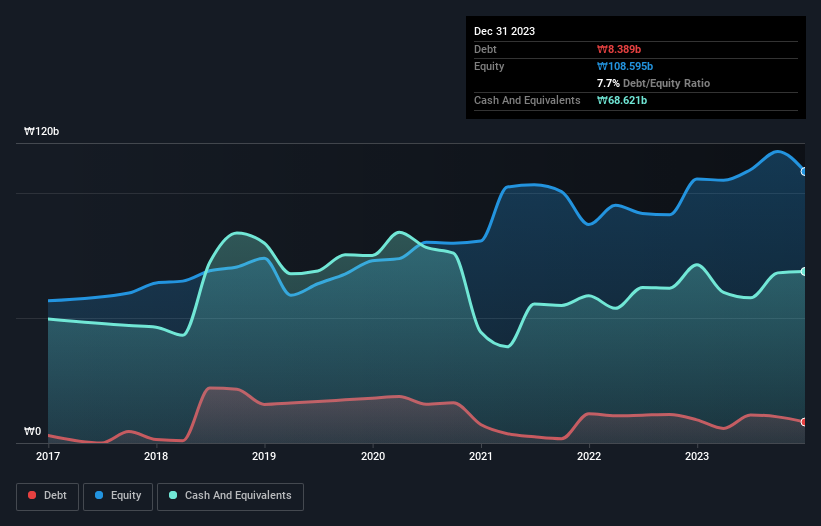- South Korea
- /
- Professional Services
- /
- KOSDAQ:A204620
Is Global Tax Free (KOSDAQ:204620) A Risky Investment?

David Iben put it well when he said, 'Volatility is not a risk we care about. What we care about is avoiding the permanent loss of capital.' So it might be obvious that you need to consider debt, when you think about how risky any given stock is, because too much debt can sink a company. We note that Global Tax Free Co., Ltd. (KOSDAQ:204620) does have debt on its balance sheet. But the real question is whether this debt is making the company risky.
What Risk Does Debt Bring?
Debt and other liabilities become risky for a business when it cannot easily fulfill those obligations, either with free cash flow or by raising capital at an attractive price. Ultimately, if the company can't fulfill its legal obligations to repay debt, shareholders could walk away with nothing. However, a more frequent (but still costly) occurrence is where a company must issue shares at bargain-basement prices, permanently diluting shareholders, just to shore up its balance sheet. Of course, debt can be an important tool in businesses, particularly capital heavy businesses. The first step when considering a company's debt levels is to consider its cash and debt together.
View our latest analysis for Global Tax Free
How Much Debt Does Global Tax Free Carry?
As you can see below, Global Tax Free had ₩8.39b of debt at December 2023, down from ₩9.26b a year prior. However, it does have ₩68.6b in cash offsetting this, leading to net cash of ₩60.2b.

How Strong Is Global Tax Free's Balance Sheet?
We can see from the most recent balance sheet that Global Tax Free had liabilities of ₩52.3b falling due within a year, and liabilities of ₩6.09b due beyond that. Offsetting these obligations, it had cash of ₩68.6b as well as receivables valued at ₩44.1b due within 12 months. So it actually has ₩54.4b more liquid assets than total liabilities.
This excess liquidity suggests that Global Tax Free is taking a careful approach to debt. Because it has plenty of assets, it is unlikely to have trouble with its lenders. Succinctly put, Global Tax Free boasts net cash, so it's fair to say it does not have a heavy debt load!
Although Global Tax Free made a loss at the EBIT level, last year, it was also good to see that it generated ₩15b in EBIT over the last twelve months. The balance sheet is clearly the area to focus on when you are analysing debt. But ultimately the future profitability of the business will decide if Global Tax Free can strengthen its balance sheet over time. So if you're focused on the future you can check out this free report showing analyst profit forecasts.
But our final consideration is also important, because a company cannot pay debt with paper profits; it needs cold hard cash. Global Tax Free may have net cash on the balance sheet, but it is still interesting to look at how well the business converts its earnings before interest and tax (EBIT) to free cash flow, because that will influence both its need for, and its capacity to manage debt. During the last year, Global Tax Free burned a lot of cash. While that may be a result of expenditure for growth, it does make the debt far more risky.
Summing Up
While it is always sensible to investigate a company's debt, in this case Global Tax Free has ₩60.2b in net cash and a decent-looking balance sheet. So we are not troubled with Global Tax Free's debt use. There's no doubt that we learn most about debt from the balance sheet. However, not all investment risk resides within the balance sheet - far from it. We've identified 2 warning signs with Global Tax Free (at least 1 which doesn't sit too well with us) , and understanding them should be part of your investment process.
Of course, if you're the type of investor who prefers buying stocks without the burden of debt, then don't hesitate to discover our exclusive list of net cash growth stocks, today.
New: Manage All Your Stock Portfolios in One Place
We've created the ultimate portfolio companion for stock investors, and it's free.
• Connect an unlimited number of Portfolios and see your total in one currency
• Be alerted to new Warning Signs or Risks via email or mobile
• Track the Fair Value of your stocks
Have feedback on this article? Concerned about the content? Get in touch with us directly. Alternatively, email editorial-team (at) simplywallst.com.
This article by Simply Wall St is general in nature. We provide commentary based on historical data and analyst forecasts only using an unbiased methodology and our articles are not intended to be financial advice. It does not constitute a recommendation to buy or sell any stock, and does not take account of your objectives, or your financial situation. We aim to bring you long-term focused analysis driven by fundamental data. Note that our analysis may not factor in the latest price-sensitive company announcements or qualitative material. Simply Wall St has no position in any stocks mentioned.
About KOSDAQ:A204620
Global Tax Free
Operates as tax refund company for foreign tourists in South Korea, Singapore, Japan, and France.
High growth potential with excellent balance sheet.

